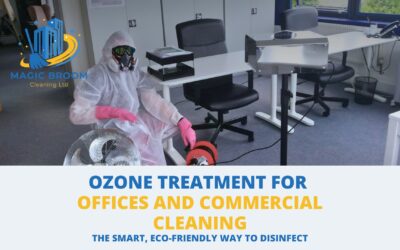Damp and mould aren’t just unsightly – they can trigger asthma attacks, damage fixtures, and create odours that undermine your brand. Bristol’s variable climate means condensation on windows, damp basements and water ingress after storms are common in offices. NHS guidance notes that damp and mould increase the risk of respiratory problems and allergies, especially for people with existing conditions. That makes damp prevention both a health issue and a facilities concern. This article explains how to protect your Bristol office from damp, outlines the main types of damp, your legal responsibilities and practical steps to protect your workplace. It’s written for facility managers and business owners in Bristol, highlighting how Magic Broom’s commercial cleaning helps keep workplaces dry.
Why is it important to protect your Bristol office from damp – health and compliance
Health risks
Mould spores and damp conditions can aggravate asthma and cause coughing, wheezing or skin irritation. People with existing respiratory conditions, children and older adults are particularly sensitive. As soon as you spot musty odours or black spots on walls, investigate and take action.
Legal duties
Under the Workplace (Health, Safety and Welfare) Regulations 1992, every enclosed workplace must be ventilated with a supply of fresh or purified air. The HSE recommends keeping relative humidity between 40% and 70%; higher levels encourage mould and dust mites. Your cleaning and facilities teams should carry out risk assessments, monitor humidity and ensure remedial works are scheduled when needed.
Poorly maintained premises with damp patches or musty smells can also harm your brand and staff morale. Tackling damp early reduces the chance of expensive repairs and signals that you care about staff wellbeing.

Types of damp and how to spot them
Identifying the source is the first step towards fixing the problem.
Condensation
Warm, moist air hitting cold surfaces creates water droplets on windows and walls. It’s common in kitchens and meeting rooms. Condensation can be managed through better ventilation, use of dehumidifiers and steady heating. Wet coats, steam and indoor plants raise humidity. Signs include streaming windows and an earthy smell.
Rising damp
If moisture rises from the ground because of a broken or absent damp‑proof course, you may see tide marks up to a metre high with flaking paint. Specialist contractors must repair the damp‑proof course. Landlords are generally responsible for structural damp, so report concerns promptly.
Penetrating damp
Water ingress through cracked walls, defective gutters or roofs creates damp patches that often spread horizontally. Fixing the source quickly – clearing gutters, repairing masonry and sealing roofs – prevents further damage.

How to protect your Bristol office from damp?
Combine daily habits with scheduled maintenance.
1. Ventilation and air quality
Open windows and trickle vents: Fresh air dilutes moisture and helps surfaces stay dry. The regulations require fresh or purified air. Encourage staff to open windows and use trickle vents, especially after meetings and in kitchens.
Fans and extractors: Ceiling fans and extractor units circulate air and remove steam. Avoid dropping the temperature too low; gentle airflow reduces condensation.
Dehumidifiers: In poorly ventilated areas such as basements, dehumidifiers help maintain a comfortable humidity level.
2. Control humidity and temperature
Maintain steady warmth: Fluctuating temperatures encourage condensation. Use thermostats to keep indoor temperatures consistent and aim for relative humidity between 40% and 70%.
Handle wet items sensibly: Provide a designated drying area for coats and umbrellas. Wet clothing and steam from kettles add moisture.
Monitor humidity: Simple meters allow you to check moisture levels. Investigate ventilation options if readings stay above 60%.
3. Manage water ingress
Fix leaks promptly: Inspect pipes, roofs and gutters; clear blockages and repair damage. Reporting small leaks early prevents major repairs.
Insulate and draught‑proof: Insulated walls, roofs and pipes reduce cold surfaces, minimising condensation. Draught‑proofing improves energy efficiency.
Maintain damp‑proof courses: Basements and ground‑floor offices need intact damp‑proof courses. If yours is over 20 years old, consult a specialist.
4. Keep surfaces clean and report issues
Clean regularly: Dust and grime absorb moisture. Regular office cleaning in Bristol helps spot problems and keeps damp at bay. Magic Broom uses microfibre cloths and appropriate cleaners to wipe down condensation‑prone areas.
Treat mould safely: Small patches can be cleaned with appropriate products while wearing gloves and masks. Large or recurring patches require professional attention.
Foster a reporting culture: Ensure staff know how to report leaks or damp; maintain a log and follow up. Government guidance recommends clear reporting processes and regular property checks.

FAQ – Office damp prevention
What are common signs of damp?
Musty smells, peeling paint, dark spots on walls, condensation on windows and a persistent earthy odour all indicate damp. Damp Solutions lists signs such as mould growth, water stains and flaky paint Regular inspections help spot issues early.
How often should we check for damp?
Carry out monthly visual checks and include damp inspections in quarterly or annual building surveys. Basements, roof spaces and rarely used rooms deserve extra attention after storms or plumbing issues.
Can cleaning alone fix damp?
Routine cleaning reduces moisture and surface mould, but rising or penetrating damp requires structural repairs. Magic Broom’s cleaners are trained to spot problems and report them; professional surveyors handle remediation.
Is damp prevention part of commercial cleaning?
Magic Broom includes damp checks and humidity advice in our standard commercial cleaning services. We can supply dehumidifiers and coordinate with landlords if repairs are needed.

As a local commercial cleaning specialist, Magic Broom works with Bristol businesses to keep offices clean, dry and compliant. Our operatives use safe methods, monitor humidity and coordinate with landlords when structural repairs are needed.
Ready to protect your office from damp? Contact Magic Broom for a free site quote and tailored damp prevention plan.




